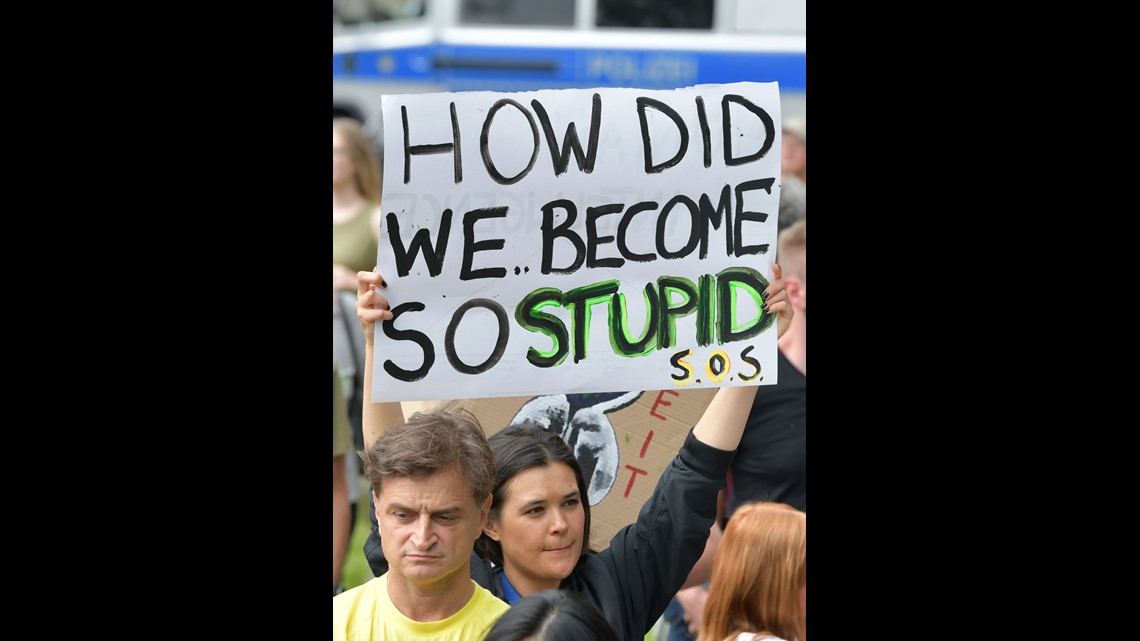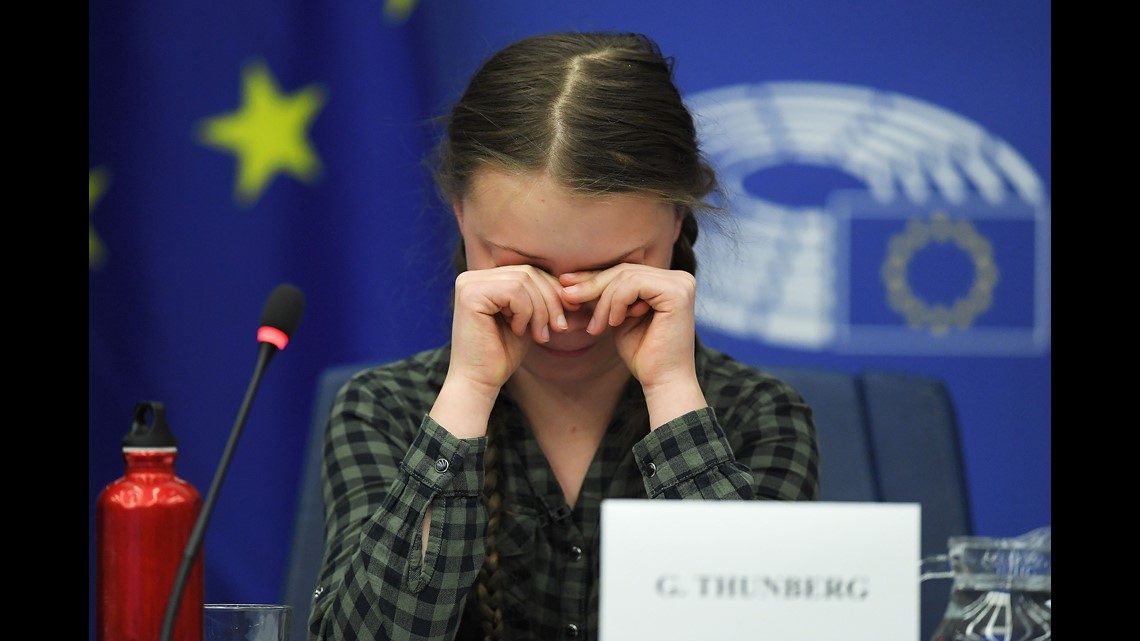(CNN) — Swedish cimate activist Greta Thunberg will cross the Atlantic on a zero-emissions sailboat on her way to speak at the UN Climate Action Summit on September 23.
Setting off mid-August from an undisclosed location in the UK, Thunberg and the crew of the Malizia II yacht will sail to New York City, where the summit will take place at UN headquarters, according to a tweet from Thunberg.
The Swedish 16-year-old has become the figurehead of a burgeoning movement of youth climate activists after her weekly protests inspired student strikes in more than 100 cities worldwide. In the UK, parliament declared a climate emergency and adopted new emission targets, partly in response to the protests.
UN Secretary-General António Guterres has called on world leaders to present concrete plans to reduce greenhouse gas emissions at the upcoming summit.
Thunberg doesn’t fly due to high levels of emissions from air travel, according to a statement, and the Malizia II will allow her to make a zero-emissions journey thanks to solar panels and underwater turbines that generate electricity.
Cutting emissions is key to reducing climate change, which could pose an existential threat to human societies by 2050 if swift and dramatic action isn’t taken, according to a report published in June.
“The science is clear and all we children are doing is communicating and acting on that united science,” said Thunberg in a statement. “Our demand is for the world to unite behind the science.”
Thunberg looked into the most environmentally friendly way to get to New York before settling on the Malizia II. The boat will be captained by Boris Herrmann, a professional race skipper, and Pierre Casiraghi, founder of the Malizia team.
“Greta is amazingly courageous to be standing up against ignorance and injustice regarding the climate crisis,” said Herrmann. “I feel humbled that Greta accepted our offer as the lowest-carbon option to cross the Atlantic — despite the lack of comfort for her.”
Thunberg’s appearance in New York City will be the first stop in a string of engagements in the Americas over the next few months, according to a statement.
Climate economics
Despite rallying student’s efforts across the world, the Czech government was among the nations that blocked the EU’s net zero emission proposal. Yet in Sweden, one of the countries that pushed for the plan, 76% of people think climate change is the single most serious problem the world is facing.


Thomas Bernauer, the director of the Institute of Science, Technology and Policy at ETH Zurich university, said the divide comes down largely to economics.
“In the wealthier European countries like Switzerland, or Germany, or Scandinavia, people have reached a certain level of well-being and pay attention to issues that go beyond their daily needs,” he said.
“If you’re in a very rich, liberal society, and you have a certain job, a sufficient income, enough food, housing, and so on, basically, you’re contained on the material level, of course you can redefine things like climate change into something that is a basic need, he said.”
“But say you’re in Bulgaria or Portugal, and there’s a 30% unemployment, and you have no prospects of finding a job, then it’s a very different calculus,” he said.
The current European divide over climate policy illustrates much deeper economic, political and cultural divisions within the bloc, according to Mike Hulme, professor of Human Geography at the University of Cambridge, in the United Kingdom.
“You have 28 countries at very different stages of economic development… . It’s partly about political leadership, it’s partly about cultural values, norms, partly about religious beliefs, it’s partly about geopolitics, and the perceptions of who holds power and influence in the world,” he said.
It’s a practical question, too. Poland is the second largest coal producer in Europe. As much as 80% of its electricity comes from coal-burning plants. The sector employs tens of thousands of people, and is seen as strategic, allowing Poland the freedom of not relying on gas from Russian.
“It’s a much easier thing to become emissions free when a country has other alternatives,” said Darrick Evensen, lecturer in Environmental Politics at the University of Edinburgh.
Climate change policies generally suffer from the discrepancy between their costs and benefits. The costs are high and imminent. Phasing out fossil fuels, which scientists say is necessary in order to limit global warming, will require huge investments into new technologies.
The benefits, on the other hand, might only become apparent by the end of the century, when most of those paying the costs now will be long gone. That makes it hard for politicians to push for a change.
“With environmental issues you’re not seeing any near-term payout, that’s the problem,” said Darrick Evensen, lecturer in Environmental Politics at the University of Edinburgh.
“But that’s something that may be changing because of the protests, the politicians are starting to see, and we’re seeing this in the UK, they do see a near-term payout for climate change legislation, because it can get them into power,” he said.
It’s a calculation that works only when there are no other major issues. “If there’s an economic crisis, urgency to create jobs, high inflation, or other things that create a lot of misery for people, those are the things that the electorate wants to be dealt with as a priority, but that doesn’t mean that climate change is irrelevant,” said Bernauer.
Sweden is one of only a handful of countries that have adopted emission reduction targets in an effort to tackle climate change. On the international stage, the Swedes have been championing action on fossil fuels.
Still, Greta Thunberg continues to spend her Fridays sitting in front of the Swedish parliament.


She says she won’t stop until Sweden is in line with the Paris Agreement. The 2015 accord aims to limit a global temperature rise this century to 1.5 degrees Celsius by dramatically cutting carbon emissions.
According to Climate Action Network Europe, a coalition of NGOs, no European country, not even Sweden, is on track to fully meet its targets.
“We will probably sit there for years to come,” Thunberg told CNN.
Songwriting with The 1975
On July 25 Thunberg and UK band The 1975 released a song in she calls for mass civil disobedience to force action on greenhouse gas emissions.
In the track, titled “The 1975,” Thunberg recites an essay over ambient music, urging listeners to join a popular rebellion against climate change.
“Solving the climate crisis is the greatest and most complex challenge that homo sapiens have ever faced,” she says. “To do your best is no longer good enough. We must all do the seemingly impossible, because there are no gray areas when it comes to survival.”
The rules have changed, says the climate activist, and people need to wake up.
She spoke at the Extinction Rebellion climate protests in London, which brought the British capital to a standstill in April. Proceeds from the song will be donated to the UK-based grassroots organization.
Thunberg says a decisive effort is needed to prevent “unspoken sufferings for enormous amounts of people,” and calls for plain speaking about the scale of the disaster facing the planet.
The track will form part of The 1975’s upcoming album “Notes on a Conditional Form,” scheduled for release in August. Singer Matt Healy said meeting Thunberg had been “such an inspiration”.
The song follows a call from prominent climate scientists to make environmental damage a war crime.
International lawmakers should agree a fifth Geneva convention that would include wildlife safeguards in conflict areas, control the spread of weapons, and make armed forces accountable for environmental damage they cause, according to a letter in the journal Nature.
The letter was co-signed by 24 scientists and published ahead of a meeting of the United Nations’ International Law Commission.



